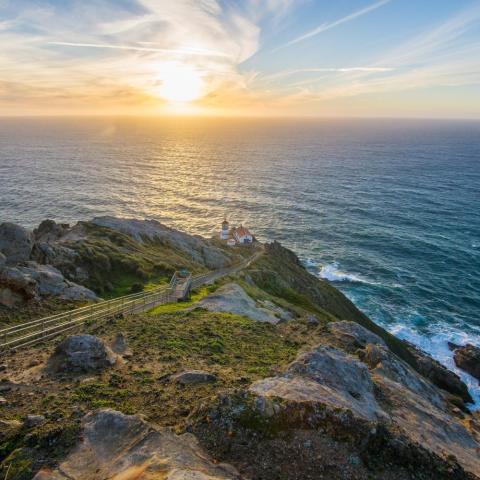
A fishing closure on the Elwha River in Olympic National Park has been extended through June 2023/NPS file
To give the native fisheries in the Elwha River and its tributaries in Olympic National Park in Washington state more time to recover, a closure on recreational and commercial fishing on those waters has been extended through June 2023. The Lower Elwha Klallam Tribe, Olympic National Park, and the Washington Department of Fish and Wildlife announced the extended closure.
In place since 2011, when removal of the two Elwha dams began, a moratorium on fishing in these waters helps protect depleted native salmonid populations, including federally threatened populations of Chinook salmon, steelhead, and bull trout. This moratorium does not apply to mountain lakes in the Elwha River basin within Olympic National Park or to Lake Sutherland, which will remain open to sport fishing from the fourth Saturday in April through October 31.
“The Tribe is eager to resume fishing on the Elwha, a river of central importance to our people and culture, which was freed in large part through the persistence of our elders,” said Lower Elwha Klallam Vice-Chair Russ Hepfer. “But out of our respect for the fish themselves, we know we need to wait a little longer until the runs are restored to the point that they can sustain some harvest. The dams were in place for 100 years and it took patience and determination to get them removed; the same patience and determination will also result in restored fisheries.”
Monitoring the recovery of salmon and trout populations is a cooperative effort among Lower Elwha Klallam Tribe, Olympic National Park, NOAA Fisheries, U.S. Fish and Wildlife Service, U.S. Geological Survey, and WDFW. Each year, project partners evaluate spawner abundance, distribution, and juvenile production throughout the river system using a variety of tools including sonar, redd surveys, snorkel surveys, tangle net surveys and smolt trapping.
Successful restoration of Elwha fish populations is measured by the abundance, productivity, diversity, and spatial distribution of fish. Positive signs of salmon recovery are being observed in the Elwha River. After final obstacles to fish migration were removed from the Glines Canyon dam site in 2016, fisheries biologists have confirmed that adult Chinook salmon, sockeye salmon, coho salmon, winter and summer steelhead, bull trout, pink salmon and Pacific lamprey have migrated upstream past that site, with some adults reaching as high as river mile 40 in the Elwha. Chum salmon have been documented upstream of the former Elwha Dam site but not yet above the Glines Canyon Dam site. Recent increases in the egg to smolt survival of Chinook salmon are also encouraging but have not yet led to substantial increases in abundance of natural-origin adults.
Future fisheries will be developed in a manner consistent with the long-term recovery objectives for the Elwha River. The Elwha Tribe, WDFW, and Olympic National Park continue to explore options to provide fishing opportunities which are consistent with recovery goals for the Elwha watershed. Recreational and commercial fishing will resume when there is broad distribution of spawning adults in newly accessible habitats upstream of the former dam sites, when spawning occurs at a rate that allows for population growth and diversity, and when there is a harvestable surplus of fish returning to the Elwha River. While there are positive signs of recovery, some fish populations remain low, and the lack of habitat use in the upper reach of the river indicates that further recolonization and spatial expansion are needed to reach population levels capable of supporting sustainable fisheries.
Due to the adverse effects of poaching on the successful and timely recovery of salmon in the Elwha, park staff encourages the public to report any illegal fishing to law enforcement at: WDFW, 360-902-2936, Lower Elwha Klallam Tribe, 360-452-6759, and Olympic National Park 360-565-3115. For updated fishing regulations on waters within Olympic National Park, please visit nps.gov/olym/planyourvisit/fishing.htm. For waters outside the Park, please visit wdfw.wa.gov/fishing/regulations/.




 Support Essential Coverage of Essential Places
Support Essential Coverage of Essential Places







Comments
I don't get it. This is at least the third time that you have delayed an opening, and always for close to another year. The dates you throw out there are obviously not based on any data or educated guess. you are just holding carrots out for the general populace. Why don't you be honest about the situation and just say that the river is closed until further notice (which is actually the true condition)? You obviously have no idea as to when the river might be able to support an even limited fishery. I'm sure that you will kick the can down the road again in 2023 (and 2024, and 2025....)
The upper Elwha had a healthy trout population prior to the dam removal. It's was the best trout fishing in western Washington. I believe there is no scientific reason that it shouldn't be opened for catch and relese fishing. Since it takes a bit of a hike in to even reach good trout habitat pressure has always been light and would continue to be so. Unfair lock out the public from this valuable resource.